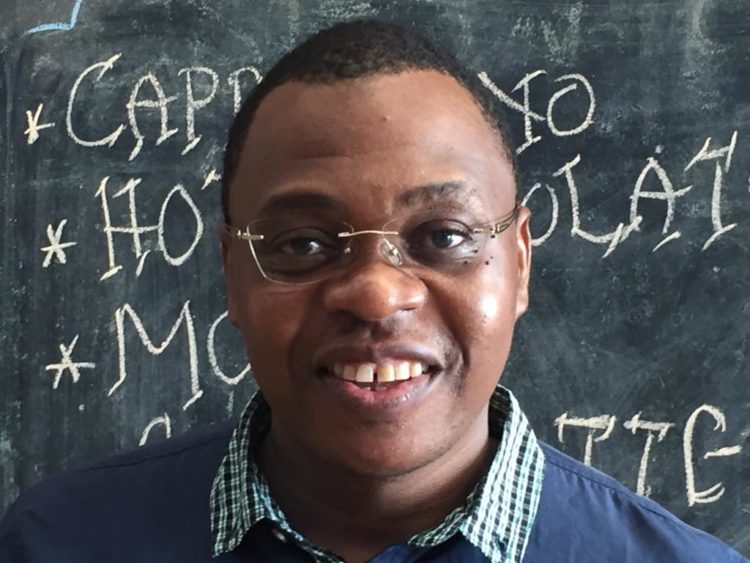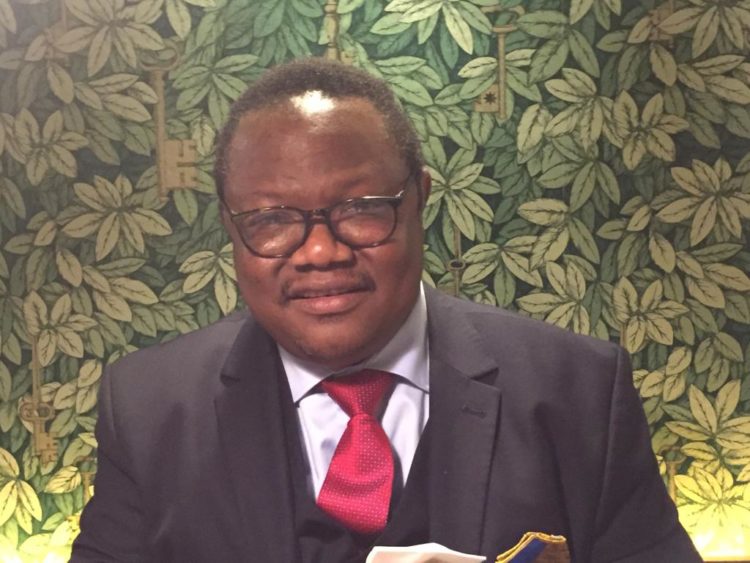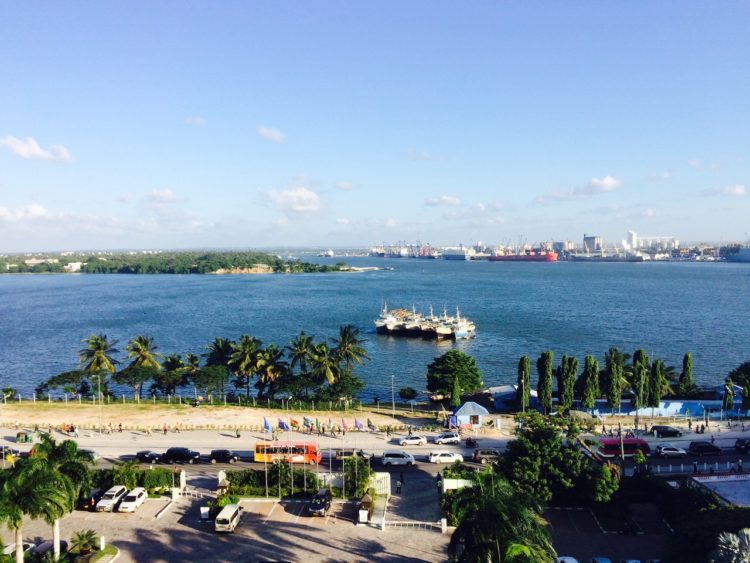Kizito Makoye Shigela is a brave man.
The journalist is unafraid to openly criticize the Tanzanian President, John Magufuli, whom he accuses of abusing the constitution. He feels that the country is returning to dictatorship, just like other East African countries. People disappear. Azory Gwanda—a reporter who researched a story that might have proven embarrassing for the powers that be—is currently missing. Opposition leader Tundu Lissu was said to be the victim of an assassination attempt in September 2017. He is still being treated by doctors in Belgium.
“Magufuli started his presidency with a lot of optimism,” says Kizito. “He promised to fight corruption, but then he attacked the constitution and restricted fundamental rights.” I got to meet Kizito in Dar es Salaam. He had proposed a restaurant where he is a regular and feels safe. A tall man with happy eyes, Kizito likes to laugh. A lot. When a friend comes to the table with cake, he says, chuckling like a little child, that today is his birthday. But Kizito does not want to party. He wants to talk about Tanzania, the political situation and the state of the press.
“We no longer have freedom of the press in Tanzania. Journalists are increasingly restricted in their work, and when they do something that the government does not like, they get problems. This is not free journalism. In fact, under the Magufuli government, newspapers were sometimes banned altogether for reporting critically on the president.” Two years ago, President Magufuli warned journalists and media owners alike: “Press freedom has its limits.” Kizito believes that the Information Minister ensures that critics are silenced.
On the issue of freedom of the press, Tanzania slipped from 93rd to 118th place in the latest Reporters Without Borders ranking. In February, the Tanzanian government closed the English language newspaper The Citizen for a week. The editors reported on the situation of the Tanzanian shilling and its strong fluctuation against the US dollar. The report put Tanzanian economic policy to the test. The publishers of The Citizen were meant to understand the one-week ban as a warning.
Kizito knows how to read such signals. He hesitates, wondering if he should talk about the issue. No laughter this time, but pause for thought. In an investigative report, he had revealed years ago that the citizens of the country do not benefit in any way from gas and coal contracts that the government signed with international energy companies. As a result of his reporting, he was threatened with anonymous messages. To make matters worse, someone sent him his own bank details and the amounts in his account. It was a clear threat: We know everything about you. “I was not worried about my life,” Kizito says, jerking forward as if to emphasize these words. “But I knew.” Lately, Kizito has been working only for international media, outlets such as Deutsche Welle, the news agency Reuters, and a Californian news portal.
Even then, the “Chama cha Mapinduzi” (CCM) party was part of the government, that is the same party that President Magufuli now represents. Ever since Tanzania gained independence in 1961, the CCM and its predecessors have been running the government and building their own networks, gradually restricting freedom of expression and association. Only half a year ago, the “Statistics Act” was tightened: official government statistics should no longer be questioned.
The media has to deal with massive restrictions through the Media Service Act. For example, the law requires a diploma to work as a journalist. This excludes many self-taught journalists. Bloggers also need a license to publish and the government is watching what is written. Under the Cyber Crime Act, publishing “false” information on the Internet can be punishable by fines and imprisonment. The Ministry of Information is the gatekeeper that gets to determine what is “wrong.”
Kizito’s colleague, the journalist Spesho Kabwanga, confirms that anyone who wants to practice journalism needs a certificate and that bloggers need a license. He works for the private Internet television Clouds TV, on a program for boys, that tackles politics and entertainment. Clouds is a multimedia media company that has won several awards as Tanzania’s “best taxpayer.”
Spesho is also a journalist known for being critical of the government. But unlike Kizito, he sees the opposition leader Tundu Lissu as an activist rather than a politician. “Lissu does a lot of propaganda, also in Europe, and wants to make everyone think like him.” Spesho criticizes Lissu, in the same way that Lissu criticizes Magufuli and accuses him of being responsible for the assassination attempt on his life. “I would like to ask Mr. Lissu how it all fits together,” Spesho wonders, “that the shots came from the left side, but his right leg was hit much harder?”
Sixteen bullets were stuck in Lissu’s body. The perpetrators arrived at lunch time and awaited the group leader of the opposition party Chadema with rapid-fire weapons in front of his apartment building. Other members of parliament lived in that building, which was supervised, but the videos from the cameras seem to have disappeared. Lissu survived and was brought to Belgium via Kenya. In social media, he keeps posting pictures from the clinic: in his bed, in his bathrobe, in his wheelchair, on crutches. It seems to be the message of an indomitable person who wants to tell the Tanzanian people that he will come back.
Lissu has been able to travel since the beginning of the year. In Germany, he has met with parliamentarians, who asked him to clarify what is happening in Tanzania. I made an appointment with him, on two different dates. The schedule is tight, tighter than originally planned, because Lissu has a lot to talk about everywhere. He hangs on to two poor crutches and looks exhausted. A dark blue suit, a red tie, a colorful handkerchief. This is the appearance of a successful businessman.
Lissu is actually a lawyer who decided to go into politics. The question of why he travels, but not to Tanzania, acts like a switch that turns him on. He almost gets angry. “The government, which should actually provide for my security, gives me no guarantees. The investigations are not progressing, the perpetrators are still not identified. On social media, unknown people openly threaten me that they will do better this time and kill me when I return to Tanzania.”
You notice the passion with which he wants to get involved. When asked why he does not bring Magufuli’s attacks on the constitution to justice, he responds calmly and with a counter question: “How independent are the courts? The dictatorship does not end at the courthouse. Besides, we have to address the crimes everywhere.” Someone has left him paralyzed, but for Lissu this is just another challenge that needs to be overcome. Then, in a low-pitched voice which is amplified by direct eye contact, he says that he is not suicidal, that he wants to return to his people before the end of the year in order to fight John Magufuli next year when his party, Chadema, nominates him as its candidate. He would leave immediately if his Belgian doctors allowed him to.
I had brought Speshos’s question, the contradiction spotted by the journalist: shots from the left side, while Lissu’s right leg was hurt more than the left. Tundu Lissu reacts quickly to the question, gets on the attack and speaks loudly. He knows these conspiracy theories. “Have these people ever seen my body full of scars? Do you know the circumstances of the assassination?”
The assassination attempt seems to be a statement to Tanzania: the ones who love Lissu are encouraging him to get up and fight. A victim who cannot be beaten down. Some people claim that Lissu was attacked by his own people, that he is now engaging in propaganda as a victim. After all, the election campaign will take place in the coming year.
The impression is of a divided Tanzania. That impression solidifies on the way between the coast and the Kenyan border. Many people are supporting Magufuli because he has promised to fight corruption. They like the way he collects taxes with a hard hand. Others are afraid of the government and just want to talk about Tanzanian politics behind closed doors. Many of the people who love Lissu do not really want to vote because they think they’ll be manipulated anyway.
“It’s not going to be easy,” says Lissu, “but I’m very optimistic that this dark time will pass in Tanzania.” He is also focusing on international politics. The German government should no longer accept Magufuli’s dictatorship. And then, in a haunting voice, he pseaks to the European refugee question. “Dictatorships cause unstable conditions. Instability causes conflict and economic chaos. And that causes migration. ”
A few months ago, Kizito Shigela commented on Facebook: “I kept eyebrowing in disbelief when a CCM official suggested that Chadema was probably behind this attack. (…) Why should Chadema see one of its most important people die? On his last trip through Europe and the United States, Lissu clarified the rationale of the attack: some powerful forces in the state wanted him. The visibly angry Lissu even used bad words to call Tanzania “the land of horrors”. (…) It would not surprise me if voters shun a clever villain and instead choose a capable political speaker who has been honed over the last two decades: Tundu Lissu. Who knows?”
Anyone who lives in Tanzania and writes publicly is a courageous man.



